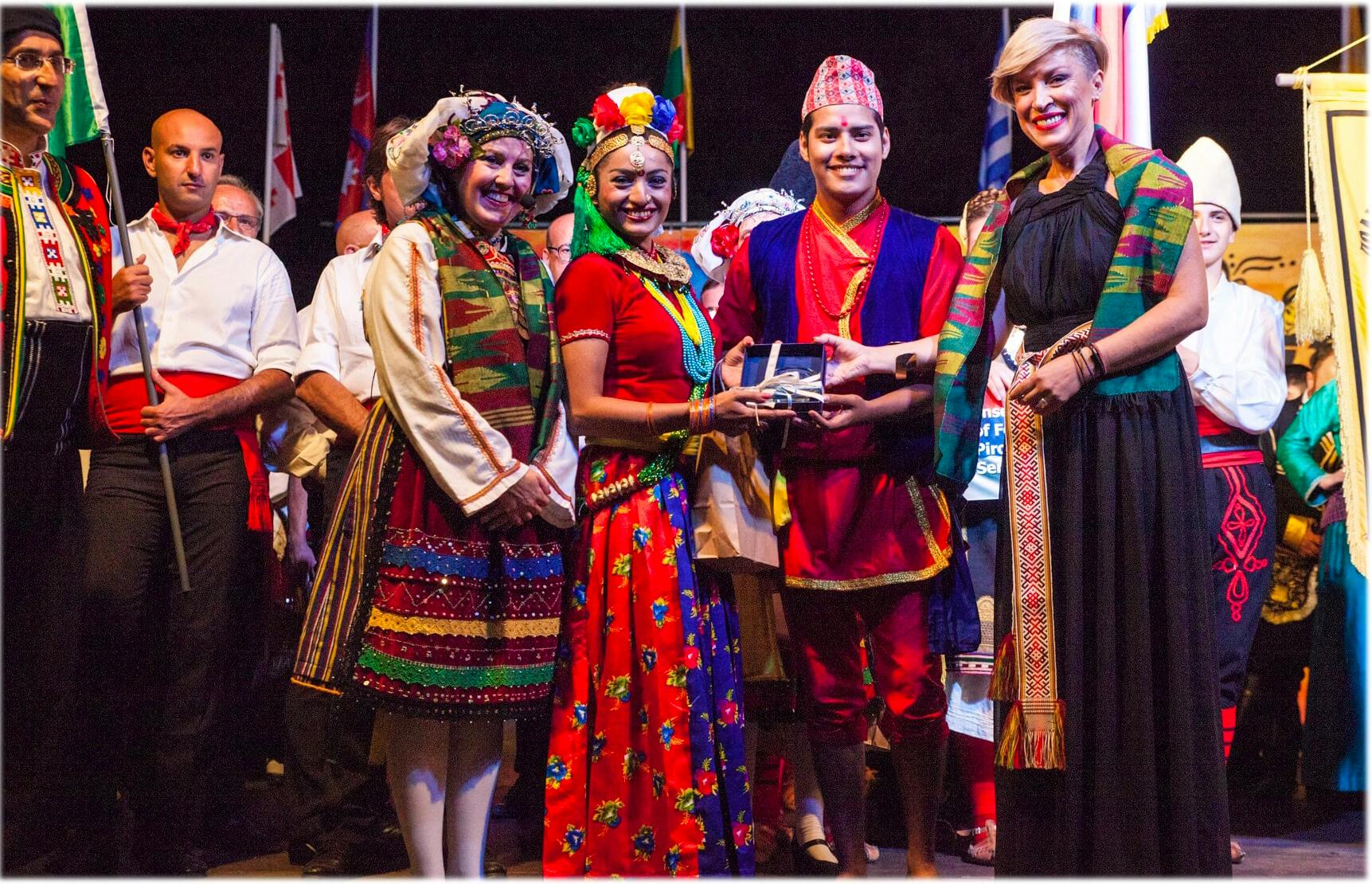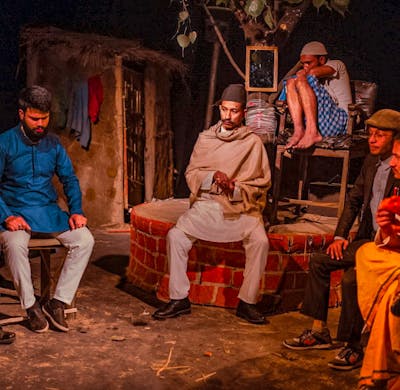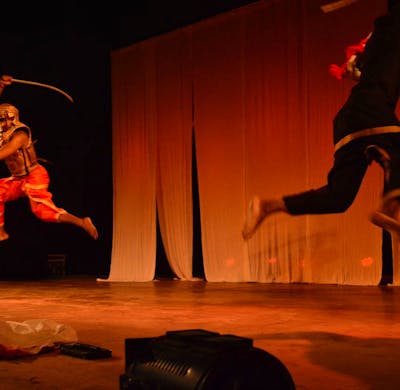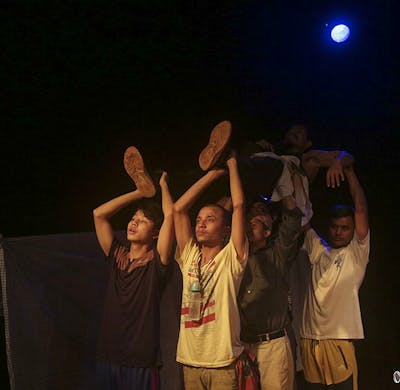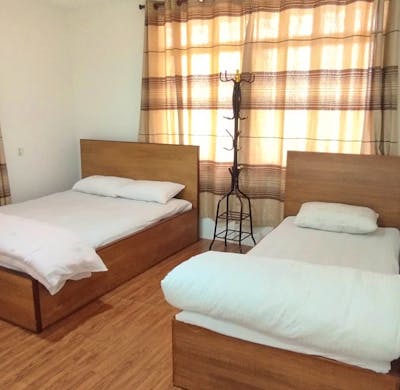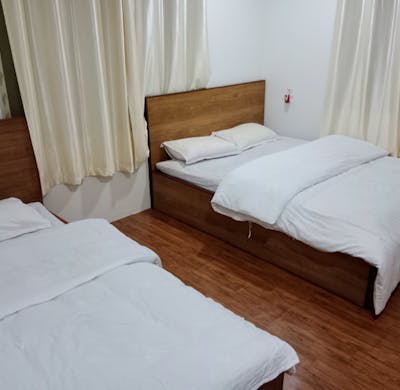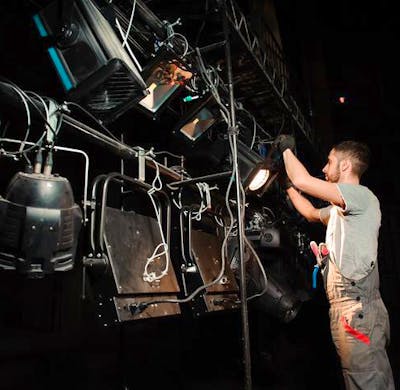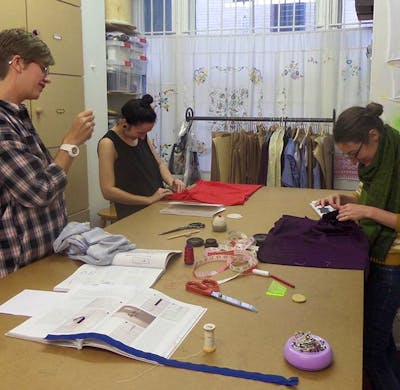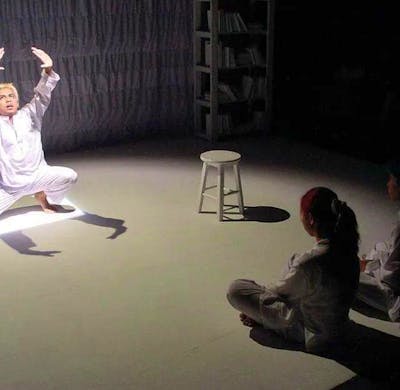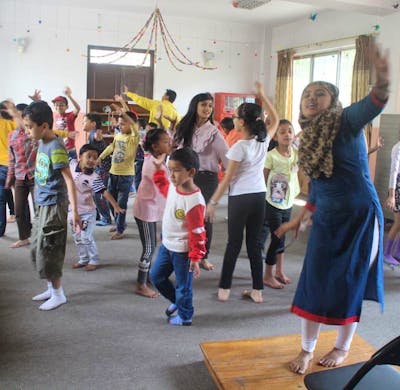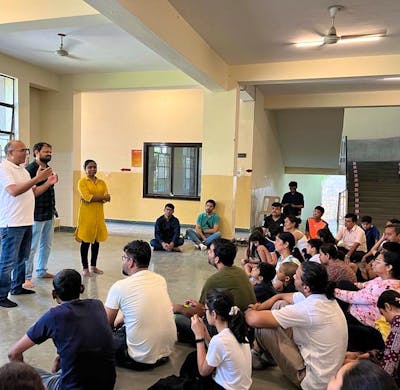We take immense pride in introducing our Acting Teaching and Workshop Volunteer Program in Nepal, welcoming individuals from diverse backgrounds to embark on a transformative journey of personal and professional growth through creative training and community service. This program offers a remarkable opportunity for participants to make a meaningful commitment to our shared community by actively engaging with the enriching programs of The Theatre Workshop.
As part of our Volunteer Program, we encourage participants to leverage their unique talents and expertise to support various aspects of acting teaching and workshop activities. Your involvement will not only benefit our organization but also make a positive impact on the local community. We offer flexible weekly commitments, tailored to specific areas of volunteering, providing a fulfilling and rewarding experience for all.
Through this program, you will not only contribute to the vibrant artistic community in Nepal but also experience significant personal growth and fulfillment. Join us on this inspiring journey of creativity, service, and cultural exchange as we work together to empower aspiring actors and nurture the theatrical landscape of Nepal.
Whether you are an experienced actor or a passionate individual eager to share your love for the performing arts, this Volunteer Program is a chance to create a lasting impact on the lives of others and the flourishing acting scene in Nepal. We invite you to be part of this remarkable endeavor, and together, let's bring the magic of theater to the hearts and minds of our community.
The Importance
The Acting Teaching and Workshop Volunteer Program in Nepal is important for the following reasons:
- Empowering Local Talent: The program provides an opportunity to nurture and empower local aspiring actors, enhancing their skills and confidence in the performing arts.
- Preserving Cultural Heritage: By engaging in theater and acting workshops, the program helps preserve Nepal's rich cultural heritage and traditional performing arts.
- Community Impact: Through community service and creative training, the program positively impacts the local community by fostering artistic expression and cultural appreciation.
- Personal Growth: Participants experience personal growth and self-discovery as they develop their acting abilities and gain valuable life skills like communication and teamwork.
- Enhancing Theater Landscape: The program contributes to the growth and enrichment of the theatrical landscape in Nepal, promoting a vibrant and dynamic theater scene.
- Promoting Inclusivity: Embracing individuals from diverse backgrounds, the program promotes inclusivity and cultural exchange, fostering a deeper understanding among participants.
- Building Confidence: Acting workshops offer a safe space for participants to explore their creativity, build self-confidence, and overcome inhibitions.
- Youth Development: The program targets the younger generation, providing them with constructive and engaging activities, promoting personal and professional development.
- Artistic Exchange: Participants from different backgrounds and experiences can share their unique perspectives, leading to a valuable artistic exchange during the workshops.
- Inspiring Change: By encouraging volunteerism and community engagement, the program inspires positive change and a sense of responsibility towards society.
The Challenges
Nepali theater faces several challenges and issues that impact its growth and development. Some of the major challenges include:
- Limited Funding: Insufficient financial support often hampers the production quality and scale of Nepali theater performances.
- Lack of Infrastructure: The absence of well-equipped theater spaces and proper facilities affects the presentation and accessibility of theater productions.
- Audience Engagement: There is a need to increase audience interest and awareness in theater, as other forms of entertainment and media often overshadow live performances.
- Limited Training Opportunities: The lack of formal training institutions for theater arts may hinder the professional development of actors, directors, and technicians.
- Language Barriers: As Nepal is linguistically diverse, language barriers can limit the reach of theater performances to specific regions and communities.
- Social Stigma: Traditional perceptions of theater as a non-lucrative career option may discourage talented individuals from pursuing it as a profession.
- Lack of Government Support: Inconsistent policies and inadequate support from the government for the promotion and preservation of theater culture pose challenges.
- Competition from Digital Media: The rise of digital media and online entertainment platforms can divert audience attention away from live theater performances.
- Unsustainable Business Model: Theater groups often struggle with financial sustainability due to limited revenue streams and high production costs.
- Conservatism and Censorship: Some conservative societal norms and censorship regulations may restrict the artistic freedom and expression of theater artists.
- Limited International Exposure: Nepali theater's limited international exposure may hinder opportunities for collaborations and cultural exchanges.
Despite these challenges, the Nepali theater community remains resilient and passionate. Efforts are being made to address these issues through collaborations, advocacy, and the collective dedication of theater practitioners. By promoting awareness and support for the performing arts, Nepali theater can overcome these challenges and continue to thrive as a vibrant cultural medium in the country.
- Advocacy and Awareness: Theater organizations and artists can actively advocate for the importance of theater in Nepali culture and raise awareness about the challenges faced by the industry. Engaging with the public and media can help build support and understanding.
- Collaborations and Networking: Theater groups can collaborate with each other, forming networks and partnerships to pool resources, share experiences, and address common issues together.
- Grant and Funding Applications: Theater organizations can explore funding opportunities from both governmental and non-governmental sources, applying for grants to support their productions and initiatives.
- Theater Education and Training: Initiatives to establish formal theater education and training programs can help enhance the skills of actors, directors, and technicians, improving the overall quality of performances.
- Community Engagement: Creating outreach programs to engage local communities and schools can help build a new generation of theater enthusiasts and supporters.
- Promotion and Marketing: Investing in effective marketing strategies can help increase audience engagement and attract more theater-goers to performances.
- International Collaboration: Encouraging collaborations with international theater groups and participating in theater festivals abroad can help promote Nepali theater on the global stage.
- Government and Policy Advocacy: Engaging with policymakers to highlight the significance of theater in Nepal's cultural landscape can lead to better support and policies for the performing arts.
- Addressing Social Stigma: Promoting successful theater professionals as role models and emphasizing the cultural and societal impact of theater can help combat the stigma associated with the field.
- Innovation and Adaptation: Exploring innovative ways to present theater, such as digital platforms and virtual performances, can attract new audiences and adapt to changing preferences.
These components further enrich the learning experience for artists in Nepal and provide a comprehensive understanding of the theatrical process. Here are some details.
Our Program Focus
- Stage Designing Workshops: Participants will have the chance to attend workshops focused on stage designing and set construction. They will learn about the principles of set design, how to create immersive stage environments, and how to effectively use props and backdrops to enhance the storytelling.
- Lighting Techniques: Lighting plays a crucial role in creating the right ambiance and mood for a theatrical performance. Our program includes classes on lighting techniques, where participants will learn how to use different lighting setups to accentuate scenes, create visual effects, and evoke emotions.
- Sound Design and Music: Sound design is another essential aspect of theater production. Participants will explore how to integrate sound effects and music seamlessly into performances, adding depth and emotion to the overall experience.
- Technical Rehearsals: Through technical rehearsals, participants will gain practical experience in coordinating technical aspects, such as set changes, lighting cues, and sound effects, to ensure a smooth and polished performance.
- Hands-on Experience: Our program emphasizes hands-on learning. Participants will have the opportunity to work with theater technicians and designers, assisting in the implementation of set designs, lighting setups, and soundscapes
- Collaborative Projects: Participants will collaborate with set designers, lighting technicians, and sound designers to understand the collaborative nature of theater production, creating an inclusive and immersive learning environment.
- Showcase and Performances: Towards the end of the program, participants will have the chance to showcase their newly acquired skills in live performances. This experience will allow them to apply their knowledge in a real-world setting and gain valuable performance experience.
By incorporating stage designing, lighting classes, and technical aspects into our program, we aim to provide artists in Nepal with a well-rounded and comprehensive theater education. This integrated approach empowers participants to not only excel in their acting abilities but also gain insights into the critical elements that make a theatrical production come to life.
Key Roles
The role of volunteers in this program is integral to its success and effectiveness. Volunteers play a supportive and essential role in various aspects of the program, assisting in its implementation and contributing to the overall experience of the participants. Here are some key roles that volunteers may take on:
- Assisting Workshop Facilitators: Volunteers can support workshop facilitators by helping with logistics, organizing materials, and ensuring a smooth flow of activities during the training sessions.
- Mentoring and Peer Support: Volunteers can act as mentors and provide peer support to the participants, offering encouragement and guidance throughout the program.
- Technical Support: For workshops involving stage designing, lighting, and sound, volunteers with technical expertise can assist in setting up equipment and ensuring the smooth operation of technical aspects during rehearsals and performances.
- Event Coordination: Volunteers can assist in organizing showcase events and performances, managing ticket sales, and ensuring a seamless experience for the audience.
- Language Interpretation: For participants who may have language barriers, volunteers proficient in multiple languages can assist with interpretation to facilitate better communication and understanding.
- Community Engagement: Volunteers can help with community outreach, promoting the program to potential participants and audiences, and fostering a sense of excitement and anticipation around the theater activities.
- Documentation and Media: Volunteers with photography, videography, or social media skills can help capture the program's highlights and create content to promote the program's impact.
- Supporting Inclusivity: Volunteers can play a role in creating an inclusive and welcoming environment, ensuring that all participants feel valued and included regardless of their background or experience.
- Cultural Exchange: Volunteers can help facilitate cultural exchange among participants, encouraging sharing of experiences and perspectives.
Volunteers are the backbone of the program, providing valuable assistance and support to the participants and program organizers. Their dedication and passion for the performing arts contribute to the nurturing and growth of theater artists in Nepal. Through their active involvement, volunteers help create a vibrant and enriching experience for all participants, fostering a sense of community and collaboration within the theater program.
The Surrounding
The locations where the volunteers will be working and living at are carefully selected to provide a conducive and immersive experience for their engagement with the theater program and the local community. Here's a description of the surroundings and locations:
- Theater Workshop Space: The theater workshop space serves as the hub of activities where the majority of the training sessions, rehearsals, and creative workshops take place. This space is thoughtfully designed with adequate seating, lighting, and sound equipment to facilitate a comfortable and stimulating learning environment.
- Theater Performance Venue: Volunteers and participants will have the opportunity to perform at a designated theater venue. The performance venue is likely to be a well-equipped theater with a stage, seating arrangements, and state-of-the-art technical facilities for lighting and sound.
- Accommodation: Volunteers will be provided with accommodation that is safe, comfortable, and conducive to rest and relaxation after a day of workshops and activities. Depending on the program, accommodation may be in guesthouses, homestays, or shared apartments. Volunteer can work in Kathmandu.
- Surrounding Environment: The locations chosen for the program are likely to be in or near vibrant urban centers, allowing volunteers to experience the unique cultural atmosphere of Nepal. The surrounding environment may include bustling streets, local markets, and opportunities to explore the city's attractions.
- Natural Beauty: Depending on the specific location, volunteers may have access to Nepal's awe-inspiring natural beauty. Surrounding areas may feature lush green landscapes, majestic mountains, and serene rivers, providing opportunities for rejuvenation and exploration during free time.
- Local Culture: Volunteers will have the chance to immerse themselves in Nepal's rich cultural heritage. The locations are likely to be in close proximity to cultural landmarks, temples, and historical sites that offer insights into the country's diverse traditions.
- Transportation: The locations will have convenient transportation facilities, making it easy for volunteers to move around the city and access various theaters and performance venues.
- Safety and Security: The program organizers prioritize the safety and security of volunteers. The chosen locations are selected with this in mind, ensuring that volunteers feel comfortable and secure throughout their stay.
Overall, the locations are selected to offer volunteers an authentic and enriching experience, where they can fully engage with the theater program, connect with the local community, and immerse themselves in the beauty and cultural diversity of Nepal.
Who you'll be working with
The volunteers will have the opportunity to work with a diverse group of individuals and stakeholders as they participate in the theater program in Nepal. Some of the key people with whom the volunteers will collaborate are:
- Theater Facilitators and Instructors: Experienced theater professionals, directors, and instructors will lead the training workshops and provide guidance to the volunteers and participants throughout the program. They will share their expertise and knowledge, helping the volunteers develop their acting and theatrical skills.
- Local Artists and Theater Practitioners: Volunteers will collaborate with local actors, directors, technicians, and other theater practitioners who are actively involved in the Nepali theater scene. This collaboration fosters cultural exchange and provides an opportunity for volunteers to learn from the experiences of their Nepali counterparts.
- Program Organizers: The program will have dedicated organizers who manage the logistics, scheduling, and overall coordination of the theater workshops and activities. Volunteers will work closely with them to ensure the smooth execution of the program.
- Community Members: Through community engagement and outreach activities, volunteers will interact with members of the local community. This engagement may include performances, workshops, or other initiatives aimed at sharing the joy of theater with a broader audience.
- Other Volunteers: Volunteers will be part of a cohesive team, collaborating with other volunteers who share their passion for theater and community service. This camaraderie fosters a supportive and creative environment throughout the program.
- Technical Crew: For workshops and performances involving stage designing, lighting, and sound, volunteers may work alongside technical crew members who manage the technical aspects of theater production.
- Performance Co-Actors: If the program includes a final performance or showcase, volunteers will have the opportunity to work closely with their fellow participants, acting alongside them in theatrical productions.
- Local Partners and Sponsors: The program may have collaborations with local organizations, theaters, or sponsors who support the initiative. Volunteers may interact with these partners during the program.
The collaborative nature of the theater program ensures that volunteers work with a diverse and inspiring group of individuals, providing a holistic and enriching experience. The interactions with theater professionals, local artists, community members, and fellow volunteers foster a sense of creativity, cultural exchange, and shared commitment to the performing arts and community development in Nepal.
Our Expectations
As a volunteer in the theater program, we expect the following from you:
- Passion for Theater: We expect volunteers to have a genuine passion for theater and the performing arts. Your enthusiasm and love for acting, directing, or technical aspects of theater will inspire and enrich the program.
- Commitment and Dedication: Volunteers are expected to be committed and dedicated to the program's objectives and activities. Consistent attendance and active participation in workshops, rehearsals, and community engagements are crucial for a successful experience.
- Openness to Learn: Be open to learning new skills and techniques from experienced theater facilitators and local artists. Embrace the opportunity to expand your knowledge and improve your theatrical abilities.
- Collaborative Spirit: Theater is a collaborative art form, and we expect volunteers to work cohesively with other participants, theater professionals, and local artists. Respect and value the input of your fellow team members.
- Creativity and Adaptability: Embrace creativity and adaptability during improvisations, workshops, and performances. Be willing to step out of your comfort zone and experiment with new ideas.
- Respect for Culture: Show respect and sensitivity to Nepali culture and traditions. Embrace cultural exchange and foster a deep appreciation for the cultural diversity of Nepal.
- Reliability and Punctuality: We expect volunteers to be reliable and punctual for all scheduled activities and events. Your commitment to time management ensures a smooth and productive program.
- Engagement with the Community: Engage with the local community during outreach activities with a warm and approachable attitude. Be a cultural ambassador, fostering connections and meaningful interactions.
- Support for Participants: Encourage and support fellow participants during workshops and rehearsals. Foster a supportive and positive environment that nurtures artistic growth.
- Feedback and Reflection: Provide constructive feedback to facilitators and organizers to help enhance the program. Take time for personal reflection to understand your progress and areas for improvement.
- Professionalism: Exhibit professionalism in your interactions with participants, theater professionals, and community members. Demonstrate respect and professionalism throughout the program.
By embodying these qualities, you will contribute to a vibrant and enriching experience for yourself and your fellow participants. Your dedication and active involvement will make a meaningful impact on the success of the theater program and the artistic community in Nepal.
What you can expect
As program organizers, the volunteers can expect the following from us:
- Support and Guidance: We will provide continuous support and guidance throughout the program. From the moment you join, we will be available to answer your questions, address concerns, and ensure you have a clear understanding of the program's objectives and activities.
- Comprehensive Orientation: You will receive a thorough orientation to the theater program, including an introduction to the workshop schedule, performance opportunities, community engagement activities, and cultural aspects of Nepal.
- Professional Theater Facilitators: We will ensure that experienced and qualified theater facilitators lead the workshops and training sessions. These professionals will share their expertise, knowledge, and passion for theater, enhancing your learning experience.
- Well-Organized Activities: We will meticulously plan and organize all program activities to ensure a seamless and enriching experience for volunteers. You can expect a structured and well-executed program itinerary.
- Safe and Comfortable Accommodation: We will arrange safe and comfortable accommodation for the duration of the program, ensuring that you have a pleasant stay during your time in Nepal.
- Diverse Learning Opportunities: You can expect a diverse range of learning opportunities, including acting training, stage designing, lighting classes, and technical aspects of theater production.
- Cultural Immersion: We will provide opportunities for cultural immersion, allowing you to experience the rich cultural heritage of Nepal through interactions with local artists and community members.
- Performance Opportunities: You will have the chance to showcase your talents and artistic growth in live performances or showcases, giving you a platform to apply your newly acquired skills.
- Meaningful Community Engagement: Through community outreach activities, you can expect meaningful interactions with the local community, sharing the joy of theater and making a positive impact.
- Collaborative and Inclusive Environment: We foster a collaborative and inclusive environment, where you can freely express your ideas, work with fellow volunteers, and build lasting connections with Nepali artists and participants.
- Feedback and Supportive Environment: We value your feedback and will create a supportive environment where you can share your thoughts and reflections to help us continually improve the program.
- Memorable Experience: Above all, we aim to provide you with a memorable and transformative experience in Nepal, one that nurtures your passion for theater, personal development, and cultural exchange.
We are committed to ensuring that your volunteer experience in the theater program is fulfilling, educational, and impactful. Your dedication and enthusiasm contribute to the success of the program, and we will do our best to create an unforgettable journey for you as a valued participant and advocate for the performing arts in Nepal.
Equipment
The specific equipment that volunteers need to bring will depend on the nature of the theater program and the activities involved. As program organizers, we will provide volunteers with a detailed list of required equipment and materials before their arrival in Nepal. Here are some common items that volunteers may be asked to bring:
- Personal Items: Volunteers should bring personal items such as clothing, toiletries, medication (if required), and other essentials for their stay in Nepal.
- Acting Attire: If the theater program involves acting workshops or performances, volunteers may need to bring appropriate acting attire, such as comfortable clothing suitable for movement and rehearsals.
- Notebooks and Writing Materials: Notebooks and writing materials are useful for taking notes during workshops, jotting down ideas, and documenting the learning experience.
- Laptop or Tablet: Volunteers may find it helpful to bring a laptop or tablet for digital note-taking, research, or multimedia work (e.g., creating digital portfolios).
- Camera or Smartphone: Bringing a camera or smartphone with a good camera can be beneficial for capturing memories, documenting the program, and creating content for social media or personal use.
- Stage Designing Tools (if applicable): If the program involves stage designing workshops, volunteers with technical expertise may bring their own tools (e.g., measuring tapes, pencils, cutting tools, etc.).
- Lighting and Sound Equipment (if applicable): For volunteers with expertise in lighting or sound design, bringing relevant equipment may be useful for technical workshops and demonstrations.
- Universal Power Adapter: Nepal uses Type C and Type D power outlets. A universal power adapter will ensure that your electronic devices can be charged without any issues.
It's essential for volunteers to communicate with the program organizers well in advance to clarify any specific equipment requirements. In many cases, the program organizers will provide the necessary tools, equipment, and materials for the workshops and activities. However, volunteers with specialized skills or preferences may choose to bring their own equipment to enhance their participation in the program.
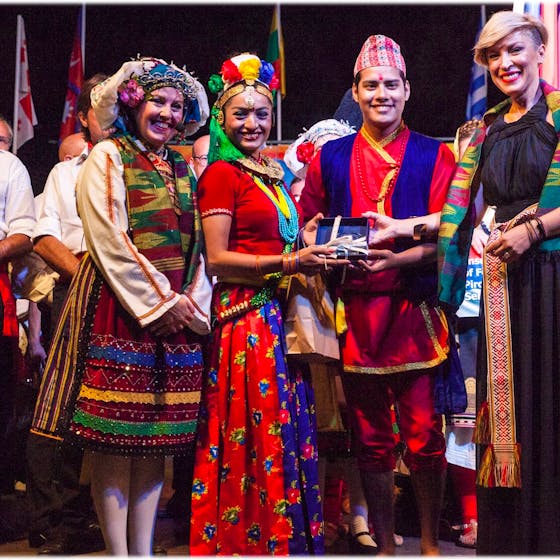
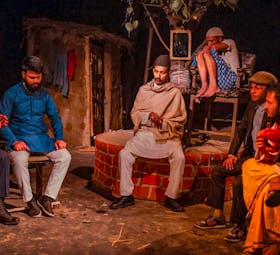

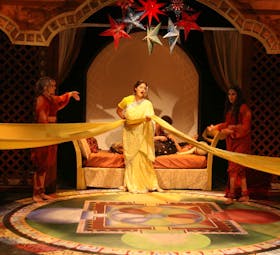
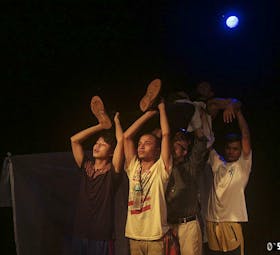

 4.3
4.3

